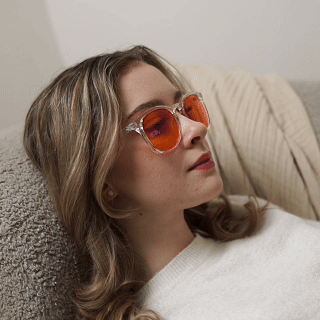
The Sleep Revolution: How Blue Light Blocking Glasses Transform Your Nighttime Recovery
Share
Blue Light: Friend by Day, Foe by Night
Research published in Frontiers in Physiology clearly shows that exposure to blue light during the day has a positive impact on our performance, alertness, and reaction time¹. During the day, blue light helps us maintain proper circadian rhythm and stay active.
However, the same factor can cause problems in the evening. Blue light disturbs our sleep, which in consequence impairing physical performance and recovery processes¹. Our brain interprets blue light as a daytime stimulus. When exposed to it at night, it disrupts the natural production of melatonin – the hormone responsible for regulating our sleep-wake cycle.
Breakthrough Discoveries: Blue Light Blocking Glasses in Action
Doubling Melatonin Levels
The first study, published in the Journal of Adolescent Health, revealed fascinating results. Participants wearing blue light blocking glasses showed twice as high melatonin levels and significantly extended sleep duration compared to the control group². This could suggest that blocking blue light may be one of the most effective non-pharmacological ways to improve sleep quality.
Game Changer for Night Shift Workers
Particularly interesting results came from a study focusing on night shift workers – a group vulnerable to circadian rhythm disorders. People using blue light blocking glasses experienced not only extended sleep duration, but also significant improvement in sleep quality and reduced frequency of nighttime awakenings³. This could be a game changer for millions of people working in shift systems, and significant for people who are out of touch with their circadian rhythm.
The Power of Orange Light
Another study confirmed the theory about the harmfulness of blue light in evening hours. Participants exposed to orange light (with filtered blue light) showed extended sleep time compared to those who remained under the influence of blue light⁴.
Hormonal Balance
The latest research published in Chronobiology International revealed that people blocking blue light showed not only higher melatonin levels, but also lower cortisol levels – the stress hormone⁵.
Addressing Criticism: Not All Glasses Are Equal
Skeptics often refer to a meta-analysis published in the Cochrane Database, which suggests insufficient evidence for the effectiveness of blue light filtering glasses⁶. The key problem with this study is that it does not distinguish between different types of glasses:
- Blue light filtering glasses – clear lenses with a subtle filter
- Blue light blocking glasses – lenses with yellow, orange, or red tinting
This difference is fundamental. Blue light blocking glasses that show effectiveness in studies are those with distinct tinting that physically prevent blue light from reaching the eyes.
Practical Conclusions
Although the scientific literature on blue light blocking is still developing, we already have enough formalized research and plenty anecdotal evidence to justify interest in this method of health optimization.
- Twice as high melatonin levels
- Lower cortisol levels (stress hormone)
- Extended sleep duration
- Better sleep quality
- Reduced frequency of nighttime awakenings
In a world where technology is an integral part of our lives, blue light blocking glasses may prove to be a simple but effective tool in the fight for better sleep and health. The key is conscious use – blocking blue light in the evening while taking advantage of its positive properties during the day.
Does this mean everyone should wear such glasses? The decision is yours, but science provides increasingly compelling arguments for this solution. After all, sleep quality is an investment in our health, productivity, and overall well-being.
References
- Frontiers in Physiology - https://www.frontiersin.org/journals/physiology/articles/10.3389/fphys.2022.943108/full
- Journal of Adolescent Health - https://pubmed.ncbi.nlm.nih.gov/28656675/
- Occupational Medicine - https://pubmed.ncbi.nlm.nih.gov/19637050/
- Journal of Clinical Medicine - https://pubmed.ncbi.nlm.nih.gov/28637029/
- Chronobiology International - https://www.tandfonline.com/doi/abs/10.1080/07420528.2023.2222816
- Cochrane Database of Systematic Reviews - https://pubmed.ncbi.nlm.nih.gov/37593770/
